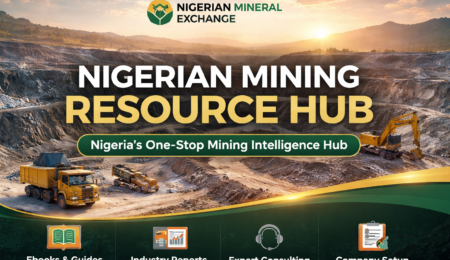Nigeria’s mining industry is one of Africa’s last great frontiers, with vast deposits of gold, gemstones, lithium, iron ore, coal, and other valuable minerals still underdeveloped. As global demand for critical minerals rises, Nigeria is positioning itself as a top destination for investors seeking high returns, first-mover advantages, and government-backed incentives.
But here’s the truth: starting a mining business in Nigeria can be profitable or disastrous, depending on how prepared you are. This guide will walk you step by step through what it takes to launch a mining business in Nigeria, legally, profitably, and sustainably.
Why Invest in Nigeria’s Mining Industry?
Before we dive into the “how,” let’s look at the “why.”
- Untapped Resources: Over 44 different mineral types across 500+ locations, many still unexplored.
- Government Support: Tax holidays, import duty waivers, and policy reforms under the Nigerian Minerals and Mining Act (2007).
- Diversification Push: With oil revenues declining, mining is now a central pillar of Nigeria’s economic diversification strategy.
- Growing Global Demand: Minerals like lithium, cobalt, and rare earths are critical for batteries, EVs, and renewable energy technologies.
- First-Mover Advantage: Unlike Ghana or South Africa, Nigeria’s mining sector is still relatively open, with prime opportunities waiting.
👉 Bottom line: If you enter now, you’re not just investing, you’re shaping the future of Nigeria’s mining economy.
Step 1: Choose the Right Mineral to Focus On
Nigeria is mineral-rich, but not all minerals are equal in terms of profitability or demand. The most popular investment options include:
- Gold: High global demand, found in Osun, Zamfara, Kaduna, and Niger.
- Gemstones: Tourmaline, sapphire, aquamarine, and topaz are highly sought after for exports.
- Lithium, lead, & Tantalite: Rising in global demand for electric vehicles and tech industries.
- Industrial Minerals: Barite, limestone, and gypsum are essential for oil & gas, construction, and manufacturing.
👉 Pro tip: Pick a mineral based on global demand, available infrastructure, and your risk appetite.
Step 2: Understand the Legal Framework
Mining in Nigeria is regulated by the Nigerian Minerals and Mining Act (2007). Key highlights include:
- All minerals belong to the Federal Government.
- Investors must obtain licenses before exploration or mining.
- Environmental and community obligations are mandatory.
Licenses are issued by the Mining Cadastral Office (MCO). Common permits include:
- Exploration License (3 years, renewable)
- Mining Lease (25 years, renewable)
- Small-Scale Mining Lease (5 years, renewable)
- Quarry Lease (for construction and industrial minerals)
👉 Pro tip: Always verify license authenticity through the MCO. Fake or expired licenses are a common fraud tactic.
Step 3: Register Your Company
Every investor, local or foreign, must register a company with the Corporate Affairs Commission (CAC).
Requirements include:
- Company registration
- Minimum share capital (varies for foreign-owned companies)
- Tax Identification Number (TIN)
👉 Pro tip: For investors, setting up a Nigerian-registered company is critical to accessing mining licenses, local banking, and profit repatriation.

Step 4: Secure Funding
Mining is capital-intensive. Depending on your chosen scale, you may need funding for:
- Geological surveys and exploration
- Equipment purchase or rental
- Site development and infrastructure
- Legal and compliance costs
- Community development obligations
Funding options include:
- Personal equity
- Joint ventures with local miners
- International investors and venture funds
- Nigerian government incentives and grants
👉 Pro tip: Always include a budget for due diligence, legal services, and compliance. Skipping these costs often leads to bigger losses later.
Step 5: Build the Right Team
Your mining business will require a mix of local and international expertise, including:
- Geologists and surveyors
- Mining engineers
- Legal and compliance experts
- Security and risk management professionals
- Community liaison officers
👉 Pro tip: Invest in community relations staff. A project without local buy-in is likely to fail.
Step 6: Meet Environmental and Social Obligations
Nigeria enforces Environmental Impact Assessments (EIA) and Community Development Agreements (CDAs).
Investors must:
- Submit environmental management plans
- Rehabilitate mined land
- Provide community benefits (employment, infrastructure, or royalties)
👉 Pro tip: Don’t treat community development as charity; it’s a core investment safeguard.
Step 7: Develop an Exit or Value-Addition Strategy
Mining profits aren’t just about extraction. Investors can maximize returns through:
- Processing plants: Export refined products instead of raw minerals.
- Trading hubs: Participate in the mineral export business.
- Joint ventures: Partner with local miners for shared risk and reward.
- Equity exits: Sell part of your mining lease or stake once value is proven.
How We Help You Start Your Mining Business
Starting a mining business in Nigeria is rewarding but complex. That’s where we come in.
1. The Nigerian Mining Investment Navigator
From project sourcing to due diligence, we guide you through every stage to ensure your investment is safe and profitable.
👉 Book your consultation now on Selar
2. Mining & Mineral Trading Company Setup (Nigeria)
We help you legally establish your company, secure licenses, and set up trading operations with full compliance.
👉 Start your mining venture today on Selar
3. Unlocking Nigeria’s Mineral Wealth: 113 Lucrative Business Ideas (Ebook)
Packed with insights on hidden opportunities in Nigeria’s mining value chain.
👉 Download instantly on Selar
Final Thoughts
Nigeria’s mining sector is no longer an afterthought; it is the next frontier of Africa’s resource economy. For investors who act now, the rewards are enormous: access to untapped minerals, government-backed incentives, and early entry advantages.
But success requires strategy, compliance, and trusted partnerships. By following this guide and leveraging expert services, you can start a mining business in Nigeria that is profitable, secure, and sustainable.
📘 The Nigeria Mineral Trading & Licensing Blueprint (2026 Edition)
If you are serious about buying, selling, or trading minerals legally in Nigeria, you cannot afford to rely on guesswork, outdated advice, or hearsay. The regulatory environment is tightening fast, and costly mistakes now lead to permit denials, seizures, or permanent blacklisting.
That’s why we created The Nigeria Mineral Trading & Licensing Blueprint: 2026 Guide to Buying Center Licenses & Purchase Permits — an updated, clear, step-by-step, insider guide that shows you exactly how to obtain Mineral Buying Center Certificates, Purchase & Possession Permits, and related approvals without delays or regulatory traps.
This guide distills real regulatory procedures for 2026, compliance requirements, and practical insights used by serious operators — saving you months of confusion, wasted money, and avoidable risk.
If mineral trading is part of your business future, this blueprint is not optional — it’s protection.
READ ALSO:





Leave a Reply